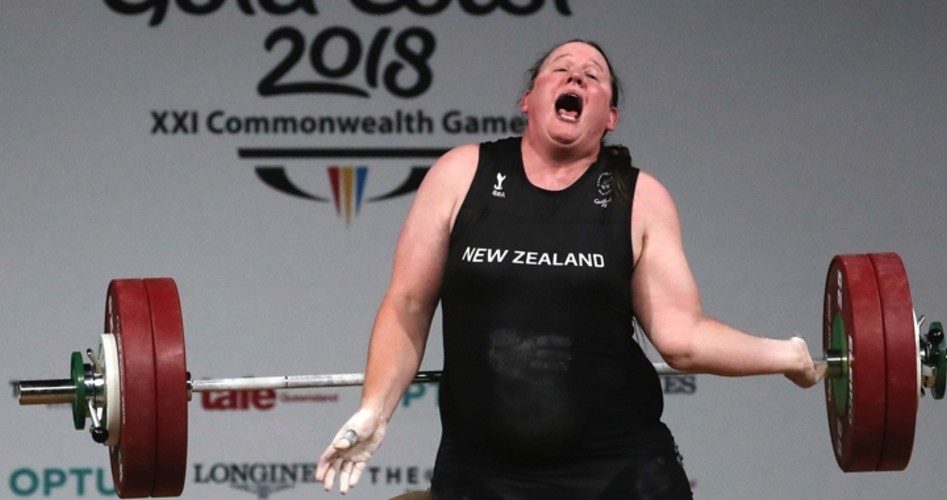
With the 2020 Summer Olympics in Tokyo looming ahead, professional female athletes continue to call into question the fairness of permitting transgender athletes to participate in women’s sports. The controversy has been spurred after transgender weightlifter Laurel Hubbard (shown) won two golds and a silver metal in three of the women’s heavyweight categories at the Pacific Games earlier this month.
Reuters notes Hubbard has competed in men’s weightlifting competitions for New Zealand in the past before his transition. Now competing as a female, Hubbard prompted outrage in Samoa at the 2019 Pacific Games after beating Commonwealth Games champion Feagaiga Stowers.
With Hubbard free to compete at the Tokyo Olympics next year, critics are voicing their opposition to the International Olympic Committee guidelines for the inclusion of transgender athletes, the Daily Wire reports.
“We’re calling on the Govt. to defend women’s sports following transwoman Laurel Hubbard taking the title in the over 87kg women’s weightlifting competition at the Pacific Games in Samoa last week,” the group tweeted last week.
British group “Fair Play for Women” has made similar statements, calling on sports officials to “wake up” following Hubbard’s Pacific Game victories.
“Another Gold for male-born weightlifter Laurel Hubbard this time at the Pacific games,” the group tweeted on July 13. “Hubbard is on track for Olympic Gold at Tokyo 2020. It’s not the women … who should be hanging their heads. Sports policy makers must wake up.”
Under IOC guidelines, biologically male transgender athletes are permited to compete as women so long as their testosterone levels remain below 10 nanomoles per liter for at least 12 months prior to their first competition. But scientists claim these guidelines are arbitrary, noting that there are other factors besides hormones that affect athletic abilities, including bone and muscle density.
In fact, USA Powerlifting board made those very points in its recently passed policy effectively banning transitioning athletes from competing against athletes whose gender matches their biological sex.
“Men naturally have a larger bone structure, higher bone density, stronger connective tissue and higher muscle density than women,” the board wrote. “These traits, even with reduced levels of testosterone do not go away. While MTF may be weaker and less muscle than they once were, the biological benefits given them at birth still remain over that of a female.”
And researchers at University of Otago published a study earlier this month that shows the mandated testosterone levels are still “significantly higher” than that of women, a point raised by Speak Up for Women in a tweet last week.
“Our sporting orgs are enabling a practice that’s been described by researchers from Otago Uni as ‘intolerably unfair’ — male athletes competing in women’s sport…We’re calling on [New Zealand Olympics], [Sport New Zealand] and the Minister for Sport [Grant Robertson], to put a stop to disadvantaging women and girls by making clear in policy and practice that sport MUST be categorised by SEX and not gender identity.”
Predictably, transgender athletes are dismissing the scientific evidence against their inclusion in professional athletics.
“The opinions of scientists although valid, are just that, opinions,” said New Zealand mountain biker Kate Weatherly, who transitioned as a teenager and has become a national champion competing against women.
Critics have argued transgender athletes should have a separate category in which they can compete.
Samoan Prime Minister Tuilaepa Malielegaoi told Reuters, “I realize we have to be inclusive and we cannot exclude these people. They ought to participate in these Games in their own category.”
Olympic champion Dame Kelly Holmes made a similar suggestion when she took to Twitter to criticize 100% Raw Powerlifting Federation for allowing transgender athlete Mary Gregory to compete. Gregory won four women’s powerlifting world records in April, though his records were later disqualified by the Federation, which determines eligibility based on biological sex and not gender identity.
“Have a trans category if need be but even better a trans games,” Holmes tweeted.
As the rules on gender identity and transgender athletes are not uniform across various sports, controversy and debate will continue to rage on.
Fears over allowing transgender “women” to participate in women’s athletics has even dominated discussion over Congress’ “Equality Act” — legislation focused on prohibiting anti-LGBT discrimination in employment and housing. During congressional testimony over the Equality Act, Duke Law School Professor Doriane Lambelet Coleman observed that biological males have an inherent athletic advantage over biological females because of the chemical makeup of their bodies, the Washington Blade reports. The intention of segregating sports based on sex was to allow individuals to compete against their own counterparts.
Even outspoken LGBT activists have raised concerns over transgender athletes. Julie Beck, a lesbian and former law and policy co-chair for Baltimore City’s LGBTQ Commission, asserts that the Equality Act would allow men to dominate women’s sports and could deny scholastic opportunities to girls who would have taken first place.
Photo: AP Images




